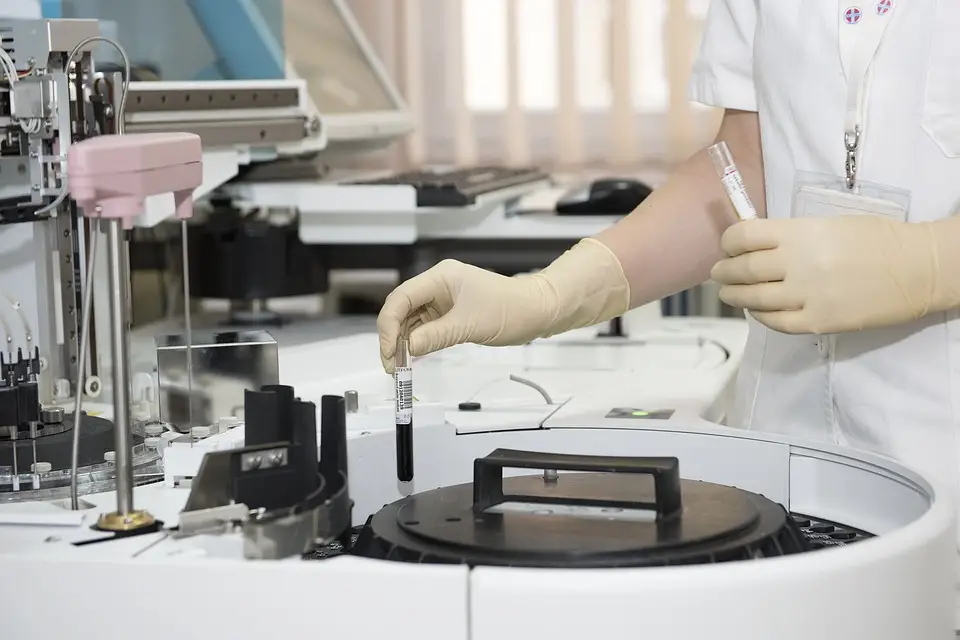We used the latest data and insights to identify the highest paying jobs for biophysics majors so that you can learn and earn more.
Do you know what the highest-paying jobs for biophysics majors are?
We’ve got the answer for you. Biophysics has already proven that it’s here to stay despite being a relatively new field. That’s because it combines biology, chemistry, physics, and mathematics. These are highly sought-after degrees by employers.
If you’re wondering what jobs are available to biophysics majors, here are some of the best-paying options.
We sourced data from the US Bureau of Labor Statistics, Glassdoor, Payscale, and other top career resources.
You Might Also Want To Know:
- 10 Highest Paying Kinesiology Jobs to Consider
- 10 Highest Paying Earth Science Jobs to Consider
- 10 Highest Paying Jobs For Biotechnology Majors to Consider
Table of Contents
#10. Medical Laboratory Technologist
How much do they get paid?
- Source: Salary.com
- Low Range: $46,329 per year
- High Range: $67,917 per year
- Median Pay: $57,601 per year

What do they do?
Medical laboratory technologists are highly trained professionals who perform diagnostic tests to help doctors identify medical conditions. They also support other laboratory staff, including technicians and lab managers. Medical laboratory technologists:
- Collect blood samples from patients
- Process specimens in the lab
- Analyze data results from various types of tests
What degrees and skills are usually required?
Most employers prefer to hire individuals with a bachelor’s degree in medical laboratory science. However, some employers may accept candidates with an associate’s degree or related experience.
Who hiring is for this job?
Most medical laboratory technologists work in a hospital or other healthcare facility. However, they may also work in private practices and research facilities.
What is the best way to get this job?
Once you have your degree, you can look for jobs through local hospitals and healthcare facilities. You should also check with your state’s health department to see if they have any job listings or resources to help you find employment.
What is it like to be a medical laboratory technologist?
#9. Food Technologist
How much do they get paid?
- Source: Payscale
- Low Range: $45,000 per year
- High Range: $79,000 per year
- Median Pay: $59,296 per year

What do they do?
Food technologists are scientists who study how to improve the quality and safety of food products. They work with different kinds of foods, including meats, vegetables, fruits, dairy products, and beverages. They may also provide advice on processing methods and packaging materials.
What degrees and skills are usually required?
Food technologists need a bachelor’s degree in food science, food technology, or related fields. They may also need to take continuing education classes to stay up-to-date on their field’s latest research and developments.
Who’s hiring for this job?
Food companies, restaurants, and supermarkets employ food technologists. These professionals may also work for government agencies or nonprofit organizations.
What is the best way to get this job?
Get your degree in food science or a related field. Then, look for jobs at food companies that are hiring. You can also check online job sites like Monster and Indeed.
What is it like to be a food technologist?
You Might Also Want To Know:
- 10 Highest Paying Fashion Jobs to Consider
- 10 Highest Paying Graphics Design Jobs to Consider
- 10 Highest Paying Accounting Jobs To Consider
#8. Biomedical Engineer
How much do they get paid?
- Source: Payscale
- Low Range: $51,000 per year
- High Range: $98,000 per year
- Median Pay: $69,246 per year

What do they do?
Biomedical engineers combine engineering and medicine to develop medical devices such as hearing aids, pacemakers, and artificial limbs.
Biomedical engineers must know how the body works to design products that will serve the needs of their patients. For example, a biomedical engineer specializing in prosthetics might create an artificial limb that is strong enough to lift a heavy object.
What degrees and skills are usually required?
A bachelor’s degree in biomedical engineering is the minimum requirement for many entry-level jobs. However, some employers may prefer applicants with a graduate degree in biomedical engineering or related topics such as mechanical engineering.
Who is hiring for this job?
Biomedical engineers work in a wide range of industries. They may be employed by hospitals, pharmaceutical companies, medical device manufacturers, or research laboratories.
What is the best way to get this job?
Job seekers can look for biomedical engineering jobs on Monster.com, Indeed, and other job sites. They may also want to consider joining a professional association for biomedical engineers to network with other professionals in the field and find out about local job opportunities.
Should you become a biomedical engineer?
#7. Biophysicist
How much do they get paid?
- Source: Salary.com
- Low Range: $58,465 per year
- High Range: $91,841 per year
- Median Pay: $70,506 per year

What do they do?
Biophysicists apply the principles of physics to investigate how biological systems work. They may study the structure and function of cells, tissues, or organisms to understand how they respond to external stimuli.
What degrees and skills are usually required?
Biophysicists typically need a graduate degree in biophysics. The most common degree is a Ph.D., but there are also many jobs for master’s-level biophysicists. This is a field that physics majors with an understanding of biology and chemistry may specialize in.
Who’s hiring for this job?
Biophysicists work in different industries and sectors. They may be employed by universities, government agencies, private companies, or research institutes. For example, pharmaceutical companies often employ biophysicists to study the effects of drugs on cells and tissues.
What is the best way to get this job?
The best way to get this biophysics job is to earn a master’s or Ph.D. in biophysics from an accredited program. Biophysicists also need strong communication skills, which can help if they have experience working with people in a laboratory setting.
Should you become a biophysicist?
You Might Also Want To Know:
- 10 Highest Paying Human Resources Jobs to Consider
- 10 Highest Paying Marketing And Advertising Jobs to Consider
- 10 Highest Paying Jobs For Sports Science Majors
#6. Biological Engineer
How much do they get paid?
- Source: Payscale
- Low Range: $50,000 per year
- High Range: $108,000 per year
- Median Pay: $72,917 per year

What do they do?
Biological engineers apply the principles of engineering to living systems. They may design, build and test equipment used in medical research or develop new ways to grow plants.
What degrees and skills are usually required?
Most biological engineers have a bachelor’s degree in bioengineering. Some employers may prefer applicants with master’s degrees. You should also have knowledge of chemical and mechanical processes and how they can be applied to living systems.
Who’s hiring for this job?
Companies that hire biological engineers include pharmaceutical and medical device companies, research institutions, and government agencies.
What is the best way to get this job?
The best way to get a job as a biological engineer is to earn an undergraduate or graduate degree in bioengineering. When you finish your training, there are many different career paths available for you.
You can work for a company that manufactures medical devices or pharmaceuticals, conduct research at a university or government agency, or consult with businesses that need help designing new products.
Should you become a biological engineer?
#5. Biophysics Professor
How much do they get paid?
- Source: Comparably
- Low Range: $41,170 per year
- High Range: $149,710 per year
- Median Pay: $75,320 per year

What do they do?
Biophysicists study the structures and functions of living things. They use their knowledge to solve problems in various fields, such as medicine and agriculture. Biophysics professors teach at colleges or universities and may also research on their own time.
What degrees and skills are usually required?
A physics degree usually a doctorate is the primary requirement for this job. You may also need some experience working with the technology used in this career
Who’s hiring for this job?
Biophysics research scientists are employed by industry, government, and academia. Industrial biophysicists may work for a pharmaceutical company or other biotech firms.
What is the best way to get this job?
The best way to get this biophysics job is to earn a doctorate in biophysics and then apply for positions at universities or companies that are hiring. You may also want to consider taking biology, chemistry, and physics courses for a broader education.
What is it like to be a biophysics professor?
You Might Also Want To Know:
- 10 Highest Paying Mechanical Engineering Jobs
- 10 Highest Paying Jobs For Philosophy Majors
- 10 Highest Paying Music Jobs
#4. Medical Technology Developer
How much do they get paid?
- Source: Glassdoor
- Low Range: $65,000 per year
- High Range: $180,000 per year
- Median Pay: $107,689 per year

What do they do?
A medical technology developer is a person who creates or develops new technologies for use in the medical field. This may include developing new equipment, software, or other products that are used to diagnose and treat disease.
What degrees and skills are usually required?
This career involves various fields, from computer science and engineering to biology and chemistry. You may need a bachelor’s degree in one of these disciplines before you can begin working as a medical technology developer.
Who’s hiring for this job?
Medical technology developers work in a number of industries. You can find employment in medical facilities, research labs, pharmaceutical companies, and academic institutions.
What is the best way to get this job?
You’ll need at least a bachelor’s degree in a related field. It can also be helpful if you have completed an internship or hands-on experience with the technology used in this career.
What is it like to be a medical technologist developer?
#3. Bioinformatician
How much do they get paid?
- Source: Glassdoor
- Low Range: $76,000 per year
- High Range: $215,000 per year
- Median Pay: $127,203 per year

What do they do?
Bioinformaticists are experts in the analysis of biological data. They use software to help them understand and interpret DNA sequences, protein structures, and other types of biological information.
What degrees and skills are usually required?
A bachelor’s degree in biology, biomedical sciences, or a related field is usually necessary for this job. A master’s degree may be required for bioinformaticians who want to work in the pharmaceutical industry.
Who is hiring for this job?
Companies such as pharmaceutical companies and medical research institutions hire bioinformaticians. You can also find jobs with hospitals and health care providers, especially those that provide genetic testing services.
What is the best way to get this job?
To get a job as a bioinformatician, start by taking biology and computer science classes. You can also earn a master’s degree in bioinformatics or computational biology.
Once you have the education and experience needed, you can begin looking for jobs. If you’re interested in working for a company that provides DNA analysis services, try finding out if they offer internships.
What is it like to be a bioinformatician?
You Might Also Want To Know:
- 10 Highest Paying Communications Jobs
- 10 Highest Paying Hospitality Jobs
- 10 Highest Paying Interior Design Jobs
#2. Medical Physicist
How much do they get paid?
- Source: Payscale
- Low Range: $89,000 per year
- High Range: $219,000 per year
- Median Pay: $152,954 per year

What do they do?
Medical physicists are radiation therapy doctors sitting between the patient and the physician. They diagnose, treat, and manage patients with radiation therapy using advanced equipment. They work with doctors to determine the best treatment options for each patient.
While medical physicists don’t need to be at a hospital 24/7, they need to work in hospitals or clinics where they can refer patients needing specialized care.
Most medical physicists also work in private practices, but this is an option for those who want more control over their schedule. Or simply prefer working alone rather than in teams of two or three people (as is common in hospitals).
What degrees and skills are usually required?
As one of the highest-paying physics jobs, medical physicists need a bachelor’s degree in physics or related fields, such as mathematics and engineering. Some employers may also require you to earn a master’s or doctorate in medical physics before applying for the job.
Who’s hiring for this job?
Hospitals, clinics, and other medical facilities are always looking for qualified medical physicists. Also, some universities hire for this position as well. You can find job listings on sites like Monster or Indeed, but it’s also good to network with others in your field of study.
What is the best way to get this job?
Once you have a bachelor’s degree, you can start looking for a job as a medical physicist. It’s important to network and make connections in the field so that you can find out about openings before they’re advertised.
You should join professional associations and attend conferences where you can meet people who are already working in the field.
What is it like to be a medical physicist?
#1. Radiologist
How much do they get paid?
- Source: Payscale
- Low Range: $99,000 per year
- High Range: $485,000 per year
- Median Pay: $309,724 per year

What do they do?
Radiologists are medical professionals who use x-rays and other imaging technology to diagnose disease. Radiologists can also perform surgeries like biopsies or remove foreign objects from a patient’s body.
They may also work with a team of physicians, surgeons, and other healthcare providers to provide care for patients.
What degrees and skills are usually required?
Radiologists typically need a doctoral degree in radiology and at least one year of clinical experience. They also need to be licensed by their state or province. This can be an intense field, so you’ll want to ensure it’s right for you before pursuing this career path.
Who’s hiring for this job?
Hospitals, imaging centers, and medical facilities of all kinds are always looking for radiologists. You may also find work at research centers or universities.
What is the best way to get this job?
The best way to get a job as a radiologist is to complete a graduate degree in radiology, which will take at least four years of study. You’ll need to pass an exam before you can practice.
What is it like to be a radiologist?
You Might Also Want To Know:
- 10 Highest Paying Management Information Systems Jobs to Consider
- 10 Highest Paying Legal Jobs to Consider
- 10 Highest Paying Industrial Engineering Jobs to Consider
Conclusion
Biophysics majors, you’ve come a long way. You’ve spent years studying the molecular structure of proteins. Now it’s time to get paid for your hard work.
We hope we’ve given you some great information to help you figure out what you should do after graduation.
Biophysics is a young field that’s still growing and changing every day. We’ll be right here with you as we continue to learn more about how our bodies work, so stay tuned for more great posts like this one.



Thanks for the information.
I am a final Year Physics major at Makerere University. I didn’t my internship from a Cancer Institute and I really liked the field of a medical Physicist that I would like to further my studies in that field.
Also, I am passionate about Renewable energy and have been attending several workshops in relation to that and it is also an admirable field.
But now I’m lost in between.
Which advice or counsel can you give me so that I can get the best out of a career field that I would go to, thank you.
Thank you for reaching out to us with your question. It sounds like you have a passion for both medical physics and renewable energy, which is great! Both fields offer unique and rewarding career opportunities.
One way to approach this decision is to research and gain more experience in both fields. You can start by looking for internships or volunteer opportunities in medical physics and renewable energy, this will give you a better understanding of the day-to-day work and help you decide which field you are more interested in. Additionally, you can reach out to professionals in both fields and ask for advice or to hear about their experiences.
Another approach is to consider how your skills and interests align with the career paths in each field. For example, if you have a strong background in physics and an interest in technology, renewable energy may be a good fit. If you have a passion for helping others and an interest in healthcare, medical physics may be the way to go.
It’s also worth considering what career opportunities are available in your area and what the job market looks like for each field.
Ultimately, it’s important to remember that your career is not set in stone, and you can always pivot or change direction if you find that one field is not the right fit. The most important thing is to keep an open mind, explore different options, and to continue to pursue your passions.
Best of luck in your career journey!